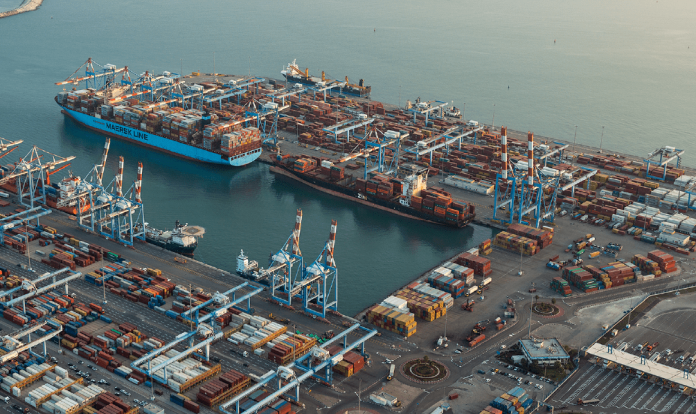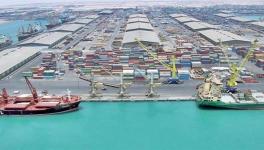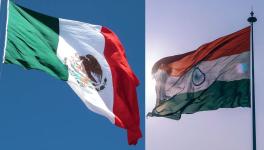Israel Reaches out to China, Again

The Bay Port at Haifa on the Mediterranean, will be operated by Shanghai International Port Group for a 25-year period
The phone call to the Chinese State Councillor and Foreign Minister Wang Yi on Wednesday by Israel’s alternate Prime Minister and Foreign Minister Yair Lapid adds to the tectonic shifts in the geopolitics of West Asia of late. Lapid reached out to China within 10 days of the visit by the US Secretary of State to Israel.
The Chinese readout plays up the Israeli overture, quoting Lapid as making a strong pitch for the two countries who “understand and appreciate each other” to leverage their “strong innovation capacity” for “accelerating the modernisation process.” Lapid stated Israel’s interest in maintaining close high-level exchanges and deepening cooperation in various fields with China.
Wang Yi reciprocated by signalling China’s interest “to push forward bilateral relations to continuously score new achievements with innovative cooperation as a key driving force.” The two leaders agreed to speed up the negotiation and signing of a free trade agreement.
This interaction further points toward the winds of change in Israeli foreign policies against the backdrop of the US disengagement from the region and the lifting of US sanctions against Iran which would likely upturn the established regional order.
The recent roundtable of the top diplomats from the United Arab Emirates, Bahrain, Morocco and Egypt in Israel’s southern Negev desert on March 28 showed a new level of comfort between Israel and its Arab neighbours. Interestingly, Wang also took note of Israel establishing “normal friendly relations with countries in the region, which should be part of the overall reconciliation in the Middle East.”
The rapid strengthening of economic ties between Israel and China through the past decade has been an eyesore for Washington. The former Israeli Prime Minister Benjamin Netanyahu certainly knew how to get away with doing things much the way he wanted. 2014 was a turning point when Netanyahu decided to fast track technological cooperation agreements with China. His high-profile visit to China in 2017 and his meeting with President Xi Jinping and his hosting of Chinese Vice-president Wang Qishan in Israel in 2018 created a new dynamic in the relationship.
The high water mark was reached last September when Israel’s first private port was opened in Haifa built and operated by the government-run Chinese company Shanghai International Port Group [SPIG]. There are high expectations that the $1.7 billion Bay Port at Haifa along Israel’s Mediterranean coast will enable larger classes of cargo ships, carrying 18,000 containers or more, to dock and boost the country’s standing as a regional trade hub.
Israel has been selling its state-owned ports and building new private docks in an effort bring down costs and reduce wait times for vessels to unload. This is important as 99% of all goods move in and out of Israel over sea and an upgrade is critical to maintain economic growth.
But for the Biden administration, it was bit too much that a Chinese state-owned company was establishing a 25-year presence in such a strategic port watching the warships of the Sixth Fleet transiting. So, to cut a long story short, when President Joe Biden took up with Bennett the issue of growing Chinese investments in Israel, including in high tech, at their very first meeting in the Oval Office last August, the latter reportedly promised to closely examine Chinese investments in Israel. Bennett went through the motions of it by stipulating that all Chinese investment proposals required clearance from his office and promised to keep Washington in the loop about any significant deals struck with Chinese firms.
According to a report in Axios, with a view to further avoiding inflaming tensions, Israel has since been giving the US advance notice of high-level talks it holds with China – as it did ahead of a virtual meeting in January at which Foreign Minister Lapid and Chinese Vice-President Wang Qishan agreed to a three-year plan for cooperation on the economy, science, R&D and technology.
On its part, China has chosen to take things in its stride, possibly sensing that in the final analysis, the Biden administration would be loathe to confront Israel whose stability is of crucial importance — in particular, at a time of friction in the relationship on account of the possible lifting of US sanctions against Iran.
The Xinhua news agency had reported last November that President Xi, in a phone conversation with his Israeli counterpart Isaac Herzog to mark the 30th anniversary of the establishment of diplomatic relations, underscored an opportunity to promote the sustained, healthy and stable development of the China-Israel “innovative comprehensive partnership.”
Chinese companies have been handling major infrastructure and transportation projects in Israel in recent years, including winning the tenders to build new ports in Haifa and the southern Israeli city of Ashdod, as well as building a key section of the Tel Aviv light rail system.
However, innovative technology has now become the buzzword (which is also what worries Washington.) China is lured by Israel’s reputation as an innovation hub of the world. What China can bring into the equation is its giant economy and tremendous manufacturing power, which makes the two sides highly complementary. In China’s transformation as an economy focused on quality-oriented development, Israel senses almost seamless business opportunities in fields like modern agriculture, medical devices, cybersecurity and smart cities.
Israel is experienced in walking the US-China technology tensions tightrope, trying to balance its commercial and security interests with the two great powers. That said, Israel’s separation of its commercial and security technology trade with China is no easy task, either. This is more so because Chinese capital is often invested via Israeli funds. According to Chinese reports, the China-Israel Innovation Parks provide physical proximity for Israeli firms to get funds and collaborate with Chinese companies in industrial research and development. Xi had told Herzog in November, “Innovation has become a highlight and booster of bilateral relations.”
China trusts Israel’s capacity to pursue independent foreign policies. Ideally, it would like the West Asian countries, including Israel, also to follow the ASEAN way in their refusal to take sides in the US-China rivalry. Israel’s stance on the conflict in Ukraine certainly reinforces this belief. Viewed through the prism of the power transition theory, it may seem there is an inevitability about China becoming increasingly involved in West Asia to protect its economic interests and to establish its own sphere of influence to undermine the US. But China’s diverse relationships in the region are giving a different picture.
Instead of militarising its regional approach to protect its growing interests in the region, China is banking on the growing reality that the behaviour and strategies of regional actors themselves are far from passive and a minimal engagement in regional rivalries could bring far more productive returns where China is seen as an “untapped resource” by the countries of the region. China-Israel relationship cautions against the compulsive view of everything in terms of US-China rivalry.
Get the latest reports & analysis with people's perspective on Protests, movements & deep analytical videos, discussions of the current affairs in your Telegram app. Subscribe to NewsClick's Telegram channel & get Real-Time updates on stories, as they get published on our website.























